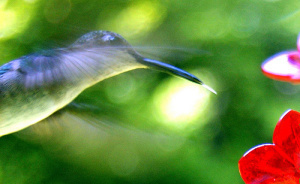the hummingbird’s tongue
 I had a moment yesterday when I wanted to quit teaching. As soon as I submitted my grades, the whining began…no matter how clear you are about the course requirements, no matter how many opportunities you give to earn extra credit, there are always a few students who think you owe them something more. I love teaching and I hope to teach for the rest of my life, but I’m wondering if there’s a way to build a life that lets me do what I love and discard all the rest. Yesterday’s meeting with Terry Boddie was great—I can’t imagine what I’d do without the support of fellow artists! Artist/professors who teach, and grade, and deal with ridiculous demands, and yet still manage to get their work out into the world (Terry’s got FOUR shows up right now). Giving up the academy would mean working as a teaching artist and supplementing my income with grants. I’ve gotten three grants so far this year, and right now I’m applying for a fourth. It’s a different kind of hustle but the good thing about writing grant proposals is that the process lends clarity to your work. Why do I do what I do, and what does my writing offer the world? I’m still working on my project summary but thought I’d share what I’ve got so far. This is Nevis book #1:
I had a moment yesterday when I wanted to quit teaching. As soon as I submitted my grades, the whining began…no matter how clear you are about the course requirements, no matter how many opportunities you give to earn extra credit, there are always a few students who think you owe them something more. I love teaching and I hope to teach for the rest of my life, but I’m wondering if there’s a way to build a life that lets me do what I love and discard all the rest. Yesterday’s meeting with Terry Boddie was great—I can’t imagine what I’d do without the support of fellow artists! Artist/professors who teach, and grade, and deal with ridiculous demands, and yet still manage to get their work out into the world (Terry’s got FOUR shows up right now). Giving up the academy would mean working as a teaching artist and supplementing my income with grants. I’ve gotten three grants so far this year, and right now I’m applying for a fourth. It’s a different kind of hustle but the good thing about writing grant proposals is that the process lends clarity to your work. Why do I do what I do, and what does my writing offer the world? I’m still working on my project summary but thought I’d share what I’ve got so far. This is Nevis book #1:
The Hummingbird’s Tongue
This nonfiction book—a blend of memoir, genealogy, and mythology—will attempt to trace the life of my paternal grandmother, Rosetta Elliott. Born on the small Caribbean island of Nevis, Rosetta was institutionalized approximately ten years after the birth of her two children, George (my father) and Ilis. Both children were removed from Rosetta’s custody when they were quite young; George was raised (alternately) by his maternal and paternal grandmothers, and Ilis was raised by her biological father and his wife (though his paternity was kept from her until adulthood). Stripped of her children, my grandmother continued to live in Nevis until the mid-1950s when she began having “fits” and was committed to an asylum in neighboring Antigua where she allegedly died.
Shortly after his mother’s death, my father emigrated from Nevis to live, for the first time, with his father in Canada. Fifteen years later, in 1972, my father returned to Nevis with my mother (who was pregnant with me at the time). They visited the asylum in Antigua and found no record of Rosetta Elliott. In his unfinished memoir my father implied that Rosetta was involved with prominent men on the island; I plan to investigate this claim and others, including speculation that my grandmother’s “fits” weren’t caused by epilepsy but by obeah (so-called “black magic”). My grandfather once worked as a policeman in Antigua—did he use his professional connections to make his former lover “disappear”? Was the news of Rosetta’s death prior to his departure for Canada a lie designed to sever my father’s connection to the less reputable side of his family?
I have lived with depression and anxiety since my teen years, and suspect that my father battled depression throughout his life as well. Fortunately, I evolved into a black feminist writer, though my commitment to self-expression led my father to call me “a stranger in the family.” I feel a strong sense of kinship with the woman for whom I was named, though we never met and I have not even a photograph of her. My great-aunt once told me that Rosetta had “hair down her back”—a significant feature for a poor black woman. Was she beautiful? Was marriage unavailable or uninteresting to her? Perhaps my grandmother traded whatever assets she had in order to survive.
If my grandmother did indeed suffer from some type of mental illness, I would like to know what symptoms she exhibited and what services were available to women in the eastern Caribbean at that time. Could any “undesirable” be institutionalized? Was Rosetta truly a danger to herself, or was her sexuality deemed dangerous to an insular, patriarchal society that expected women to know and stay in their “proper place”? The 2009 study of Nevisian girls, Pleasures and Perils by Debra Curtis, reveals disturbing patterns of coercion and early experimentation with sex; my book will consider contemporary conditions for women in Nevis and will offer strategies to ensure that girls have the tools they need to recognize and resist exploitation and marginalization.
 Green-Throated Caribbean Hummingbird
Green-Throated Caribbean Hummingbird











